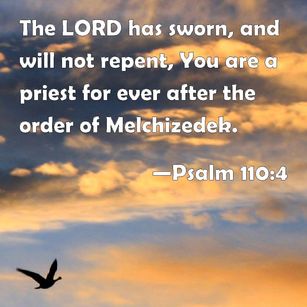
The Promise Of Victory And Dominion
This psalm of David has obvious Messianic overtones. In a conversation with some Pharases Jesus Himself quotes what is verse one of the psalm.
Matthew 22:41-46 (NKJV)41 While the Pharisees were gathered together, Jesus asked them,42 saying, "What do you think about the Christ? Whose Son is He?" They said to Him, "The Son of David."43 He said to them, "How then does David in the Spirit call Him 'Lord,' saying:44 'The LORD said to my Lord, "Sit at My right hand, Till I make Your enemies Your footstool" '?45 "If David then calls Him 'Lord,' how is He his Son?"46 And no one was able to answer Him a word, nor from that day on did anyone dare question Him anymore.
In writing this psalm David is speaks prophetically and uses the term “the Lord said”. That is a term frequently used by the prophets.
The king is commanded to occupy the position of highest honor and share the divine rule until his enemies are completely destroyed.
Joshua 10:24 (NKJV) So it was, when they brought out those kings to Joshua, that Joshua called for all the men of Israel, and said to the captains of the men of war who went with him, "Come near, put your feet on the necks of these kings." And they drew near and put their feet on their necks.
1 Kings 5:3 (NKJV) You know how my father David could not build a house for the name of the LORD his God because of the wars which were fought against him on every side, until the LORD put his foes under the soles of his feet.
The prophetic utterance is addressed to “my Lord”, a title of respect used for a king or superior. This king is to be honored and protected by divine blessing. His rule is to be universal. His subjects are to be willing volunteers. This is a certainty because the prophecy includes the appointment of the king as a priest. The Messianic ruler serves a priestly as well as a royal office as did ned to Melchizedek, the priest-king of Salem.
Genesis 14:18 (NKJV)18 Then Melchizedek king of Salem brought out bread and wine; he was the priest of God Most High.
Jesus’ ministry was was compared to that of Melchizedek.
Hebrews 7:14-17, 20-22 (NKJV)14 For it is evident that our Lord arose from Judah, of which tribe Moses spoke nothing concerning priesthood.15 And it is yet far more evident if, in the likeness of Melchizedek, there arises another priest16 who has come, not according to the law of a fleshly commandment, but according to the power of an endless life.17 For He testifies: "You are a priest forever According to the order of Melchizedek."20 And inasmuch as He was not made priest without an oath21 (for they have become priests without an oath, but He with an oath by Him who said to Him: "The LORD has sworn And will not relent, 'You are a priest forever According to the order of Melchizedek' "),22 by so much more Jesus has become a surety of a better covenant.
The psalm ends (verses 5-7) on the battlefield where the Lord (the king in this psalm and the Messiah in the prophecy) completely destroys his enemies. The vivid language and imagery clearly show the absolute finality of the victory.

 RSS Feed
RSS Feed